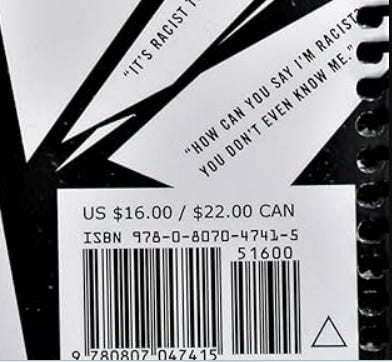Because writing directly about the war in Israel is so triggering, I want to take an oblique approach to what I believe is the underlying error in much of the argument.
While I don’t blame Robin DiAngelo for the current state of public discourse, I do think her book White Fragility is an example of the problem.
I wrote a multi-post review of White Fragility three years ago. The underlying world view (aka philosophy) of this book is very alive and well today. I can see its echoes in the strident voices supporting Hamas (the weak and powerless) against Israel (the privileged and powerful.) I decided to revisit the topic of Critical Theory through the lens of this book and will start with the original post of my review of White Fragility.
Previously on The Glob I promised to buy the book, "White Fragility", read it, and report on it. I've only read the dust cover art on the back of the book, the glowing reviews on the inner flaps, scanned the introduction and forward, and read the Introduction titled, "We Can’t Get There from Here.”
First the back cover - it is an image of shattered glass, a white pane against a black background, and each shard has some words. The one that caught my eye and triggered (heh heh) this article was the one that said,
"How can you say I’m racist? You don't even know me."
Just to clearly paint the picture, this is one of the shards representing white fragility.
Regarding the Introductory chapter - I remember in my youth sometimes people would ask for directions, and some wag would say, "You can't get there from here." I remember thinking, Yes you can! and so I started saying, "You can't get there from here, you have to go somewhere else first." I'm going to guess that is the point of this chapter. To move forward, we have to leave where we are. Well and good.
However, in this chapter she addresses the shard that caught my eye. She comments that most people have this idea that racism is a bad thing done by bad people, and most white people do not believe they themselves are racist. She goes on to say that if that is what you think racism is, then you are right to be offended if she calls you a bad person doing bad things.
I find myself agreeing with her. I realize that many people, including myself, have racist mindsets or tendencies even if they don't act on them. And many people are in denial about these thoughts and feelings.
But, that's not what she means by racism. She means something else entirely: "If you are white, you are a racist." No, seriously. Racism is basically defined as being white. Again, seriously.
It's a bait and switch in my mind. She says she is going to talk about racism, but what she means by that is she is going to talk about white people. She also asserts that she has every right to paint with a broad brush and generalize, because, well, because all her time giving seminars has taught her that she is right. The below cartoon represents all, and she does mean all, white people:
All white people in the United States are freaked out if someone wants to discuss race. All of them. How does she know this? From her seminars.
Folks, this is called confirmation bias - "Nobody likes what I'm saying, this proves I am right." Somewhere in these first few pages she acknowledges that she realized that she needed to get her message out via book, because in an audience it was just too hard.
For an outsider looking in, what it says to me is that as a speaker she does not know how to connect with her audience. How convenient that the problem is the audience. Over and over with different audiences.
Rather than think through how she is presenting her information, she doubles down, viewing angry peoples as confirmation of her views.
I am interested to see where she goes with this.
I will follow up with this series once a week, on Tuesdays. I do have a spoiler. The author’s book is one of the many streams which flow from Critical Theory.
What is Critical Theory?
“According to these theorists, a “critical” theory may be distinguished from a “traditional” theory according to a specific practical purpose: a theory is critical to the extent that it seeks human “emancipation from slavery”, acts as a “liberating … influence”, and works “to create a world which satisfies the needs and powers of” human beings (Horkheimer 1972b [1992, 246]).1
This theory and its offspring have in my opinion become the de facto world view underlying much of the strident “thought” regarding the current situation in Israel.
https://plato.stanford.edu/entries/critical-theory/





